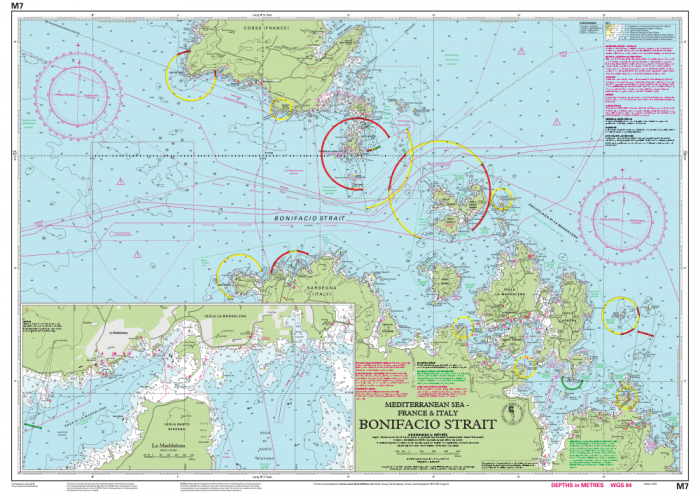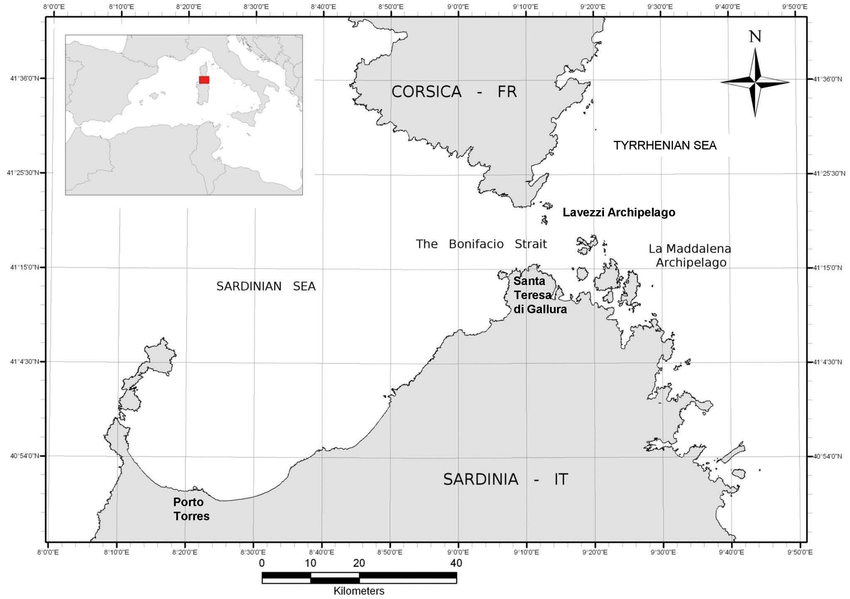The Strait of Bonifacio, 3.23 miles wide at its narrowest point, runs between
the French island of Corsica and the Italian island of Sardinia. (See Map 34.)
While it connects two parts of the high seas, navigation through the strait is
difficult because of the many islets and rocks. The Messina Strait exception
under article 38(1) does not apply because Bonifacio separates islands belonging
to two different States.


In 1979, IMO Resolution A.430(XI) endorsed the decision of France and
Italy to establish a system of surveillance and information for ships passing
through the strait. In 1993, these two States enacted domestic regulations which
prohibit transit through the strait by ships flying their flags which transporting
hydrocarbons or other dangerous substances. That same year, at the request of
France and Italy, the IMO Assembly adopted Resolution A.766(18) on navigation
in the Strait of Bonifacio. The resolution recalled the necessity of protecting
the vulnerable coasts of France and Italy in the vicinity of the strait in view
of their ecological value, while at the same time recognized the importance of
not derogating from the right of navigation through international straits such
as the Strait of Bonifacio. The resolution also noted that laden oil tankers and
ships carrying dangerous chemicals neither bound for, nor sailing from, French
or Italian ports, are able to take routes which are equally convenient from the
point of view of navigation or hydrographic characteristics. By the Resolution,
the IMO:
- Recommends Governments to prohibit or at least strongly discourage the transit
of the Strait of Bonifacio by laden oil tankers and ships carrying dangerous
chemicals or substances in bulk liable, in the event of a casualty, to pollute the
sea or the coasts, as listed in the annex to resolution MEPC.49(31) adopted on
4 July 1991, and which are flying the flags of their respective States; - Endorses the Regulations concerning a system of surveillance and information
for ships in the Strait of Bonifacio set out in the annex to the present resolution.
As these prohibitions are limited to ships flying the French and Italian flags,
and only recommendatory as to third States’ ships, the regulations do not seem
to contravene the rights of user States.
In 2010, France and Italy proposed to MEPC 61 that the Strait of Bonifacio
be designated as a Particularly Sensitive Sea Area, and that compulsory pilotage
be one of the associated protective measures. During consideration of the
proposal, France and Italy withdrew their proposal for establishing a mandatory
pilotage system. In that connection, the United States said in part:
We are grateful to France and Italy for revising their proposed measure concerning
pilotage for ships navigating through the Strait. We had concerns that the original
proposal for mandatory pilotage did not identify the legal basis for that measure.
We were unsure if the intention was to rely on the Committee’s resolution that
may be adopted to establish a PSSA in the Strait of Bonifacio as the legal basis for
mandatory pilotage. An MEPC resolution does not provide an international legal
basis for mandatory pilotage for ships in transit in any strait used for international
navigation.
In connection with the designation of the Strait of Bonifacio as a Particularly
Sensitive Sea Area by MEPC 62 in July 2011, a recommendation on navigation
through the Strait was approved as the Associated Protective Measure,
subject to the adoption by MSC 90 in 2012. The recommendation contained
the following three elements:
• A requirement to exercise full diligence and regard for the existing two-way
route in the Strait.
• A requirement to use the existing mandatory ship reporting systems
(BONIFREP).
• A recommendation to take a qualified pilot when passing through the
Strait.

